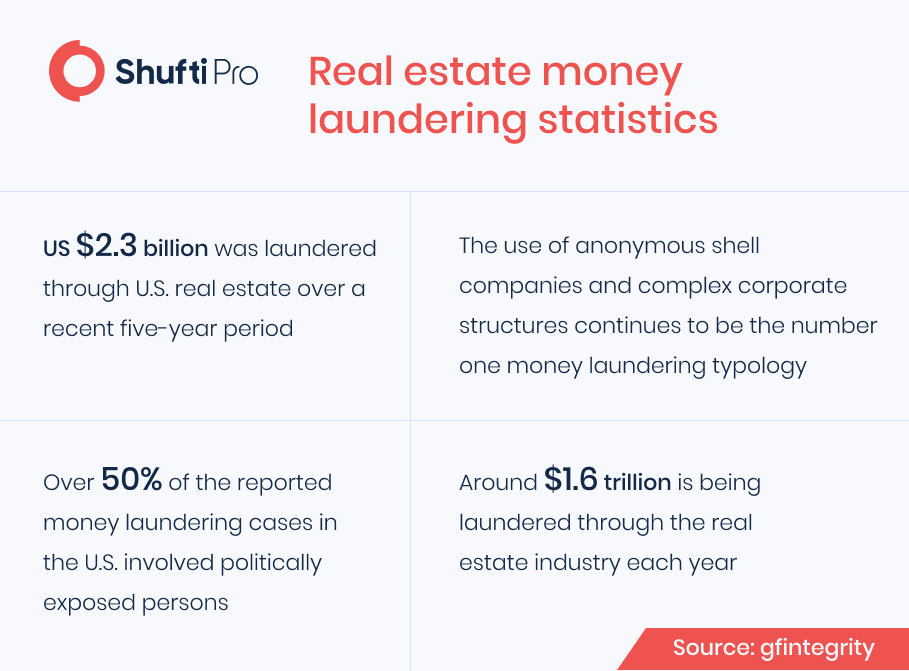Curbing Real Estate Crimes and Hunting Down Russian Investors with Shufti’s AML Screening Solution

The real estate industry has become attractive to money launderers in the same way it is to any legit investors. It is considered a significant component of a measured investment or business strategy that is most likely to appreciate over time. Washing illicit gains have always been the primary incentive of money launderers. Keeping in mind this fact, the real industry sector holds significance among the criminal community. However, with time the criminals along with the methods of money laundering through the real estate sector have become more sophisticated. Like other businesses, real estate is one of the viable sectors in which large amounts of money are changed hands the most.
However, the global real industry is full of loopholes and has weak infrastructure that fascinates perpetrators to continue their nefarious activities. Therefore, the regulatory authorities like FINTRAC, EU, FATF and various others have systematically structured regulations and standards for the real estate industry. While forming Anti-Money Laundering (AML) and Know Your Customer (KYC) compliance, the regulatory bodies need to collaborate with the businesses to understand the root causes to deter them in a precise manner.
The Rise of Real Estate and Financial Crimes
For money launderers, the real estate market renders a cover of legitimacy and respectability that includes explainable high-value transactions and are frequently subject to weak scrutiny in many jurisdictions across the world. In fact, money laundering techniques are getting diverse, which particularly aim to hide the true identities of the investors along with the source of income used to purchase properties. As published in various reports like “Panama Papers”, shell companies are majorly used to purchase high-valued properties like apartments etc, to obscure their identities.
However, the money laundering risk linked with property is made further complex when the buyer doesn’t require lender financing or legit financial firms to make transactions. In addition to this, other parties including the agents, insurance companies, and settlement attorneys are also involved in such cases, where there is no set of rigid AML compliance obligations in certain jurisdictions. Similarly, when the properties are sold, the legit proceeds of corruption or financial crimes can be further integrated into the monetary system and the illicit sources can further get distanced through opaque structures like NGOs and shell companies in order to make them look legit. However, the earnings may also be reinvested in other properties, luxury goods, yachts, and high-priced cars and hence, cash gets clean.

DOJ Task Force Hunts for Russian Real Estate in the United States
The government of the United States has formed a task force to hunt down the Russian assets in the country, particularly targeting the real estate industry with orders of not only imposing sanctions but seizing properties. The Department of Justice-run Unit has charged task force KleptoCapture with zeroing in on Russian oligarchs along with the financial support of the Russian government. The initiative also includes new law enforcement resources to existing sanctions, which only freeze or block targeted or flagged real estate assets and transactions.
“Asset seizures and civil forfeitures of unlawful proceeds — including personal real estate, financial and commercial assets — will be used to deny resources that enable Russian aggression,” the DOJ said in a statement.
However, these efforts aim to put pressure on the Russian President, who is continuously defending Ukraine’s invasion. The force also includes money laundering investigators that will gather the foreign evidence and are expected to get on board by the FBI, Secret Service, IRS and other agencies’ agents. Therefore to find the Russian assets and prosecute violators, the US government is determined to increase the scrutiny of real estate agents and brokers.
“This puts a real burden on the real estate industry to do really thorough due diligence,” said Firestone. “You don’t want to get caught accepting money from a foreign criminal.”
U.K. Taking a Major Steps to Curb Money Laundering Through Real Estate, To be Effective Against Russia
Last week, the UK Parliament passed a reform to make the British real estate industry’s regulation more rigid. However, the reform was direly needed as numerous financial crimes in the country’s real estate sector, including recent revelations associated with Russia’s invasion of Ukraine will have significance in identifying and mitigating the sanctions evasion and economic crimes. In addition to this, the government’s attention on the illegal Russian oligarch funds has brought long-standing vulnerabilities of the real estate industry to light. As the other countries are also working to impose sanctions against Russia, the UK is also advancing with its new rules to enhance transparency in the real estate market.
Under this reform, a public register of the owners of international businesses that own property in the UK will be maintained. In addition to this, reforms regarding Unexplained Wealth Orders (UWOs) will also be formed to ensure that the properties bought in the country come within the scope of these orders and also expands the definition of asset holder. However, the register will be publically accessible, making it the largest AML policy since the legislation of the beneficial ownership registry in 2016.
Global Regulations Mitigate Real Estate Crimes
EU’s AMLD6
In the light of the European Union’s Sixth Anti-money Laundering Directive (6AMLD), the real estate industry needs to integrate robust identity verification solutions in order to comply with know your investor, know your business, know your customers and beneficial ownership regulations. In addition to this, businesses are also obliged to have in-house AML control systems to screen investors as well as verify their transactions. However, under the 6AMLD the real estate businesses that fail to comply with the regulation can face hefty fines and sanctions.
FATF’s Recommendations
The Financial Action Task Force (FATF) is an international law enforcement authority that legislates anti-money laundering and countering terrorist financing regulations and comprises 37 member countries and two regional organizations. Under the FATF’s Recommendation 22, the real estate industry comes under the branch of Non-Financial Businesses and Professions (DNFBP). Thus, FATF mandates all real estate businesses to conduct customer due diligence procedures to verify customers among other anti-money laundering obligations.
The USA Patriot Act
Under the light of the USA Patriot Act, the real estate industry is subject to anti-money laundering regulations. However, this sector was given a temporary exemption from authenticating investors’ identities, yet it can be implemented for engaging in money laundering or terrorist financing.
How Shufti Can Help
With the surge in financial crimes, the real estate industry is becoming subject to anti-money laundering and know your customer regulations. Thus, determining the source of money laundering and other crimes is getting hard and the real estate businesses are challenged to stay put with the AML compliance as well as fight financial criminals.
Shufti’s all-in-all Anti-Money Laundering (AML) solution is a viable option for real estate brokers as it allows them to stay compliant with regulatory standards and enables them to onboard legit investors. Powered with thousands of AI algorithms Shufti’s AML screening solution authenticates customers against 1700+ global financial watchlists in less than a second with 98.67% accuracy.
Want to learn more about AML screening solutions for the real estate sector?

 Explore Now
Explore Now













